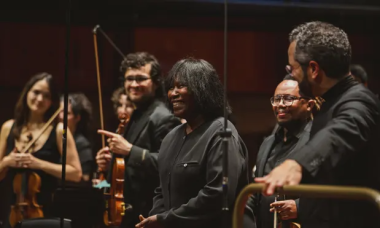 United Kingdom Armatrading, Tchaikovsky: Chineke! Orchestra / Andrew Grams, Adam Gibbs (conductors). Queen Elizabeth Hall, London. 24.11.2023. (CK)
United Kingdom Armatrading, Tchaikovsky: Chineke! Orchestra / Andrew Grams, Adam Gibbs (conductors). Queen Elizabeth Hall, London. 24.11.2023. (CK)

Tchaikovsky (arr. Duke Ellington) – Nutcracker Suite: Overture
Joan Armatrading – Symphony No.1 (world premiere)
Tchaikovsky – Symphony No.5
‘I always knew I would write a symphony…it was just a matter of when.’ Thus, matter-of-factly, Joan Armatrading on BBC Radio 3 a few days before this concert – sold out, thanks no doubt to her, weeks in advance. No angst, she told us, no specific inspiration: she just sat down and wrote it. For her, classical music is just another genre. Some listeners may have found this alarming; others may have found it refreshing. A symphony crafted by a self-taught multi-instrumentalist who has been creating for over half a century across a wide variety of genres: why not?
The performance will be broadcast on Radio 3 on Tuesday 28th November (and available afterwards on BBC Sounds): Decca are apparently to record the work. My responses here are therefore preliminary and provisional: the broadcast may turn them upside down.
In some ways, Armatrading’s symphonic aims are modest: four movements, lasting a little under half an hour, for an orchestra no larger than that for Tchaikovsky’s Fifth (played after the interval): the only extras she allows herself are an electric piano and cymbals. On first acquaintance it seems a symphony of the middle ground: extremes – of tempo, of register, of dynamics, of overt emotional expression – are largely avoided. The expansive opening movement (composed last) begins with rich, glowing sounds from the brass choir; and the music quickly assumes a spacious open-heartedness that brought Copland to mind – not in sound, but in feeling. The soul of this music is not conflict or drama but lyricism, relying on repetition and variation rather than development. Like the open-air tang of Dvořák’s music – no more comparisons, I promise – it wins us with its honest, lilting character: simple ideas in supremely attractive dress. The movement, like the succeeding three, was enthusiastically cheered.
Armatrading composed the second movement first, approaching it as she would a song. This time the strings set the music in motion, the violins and flutes usher in a beguiling melody. Unexpectedly, a turbulent section breaks in – electric piano, bass trombone and tuba prominent – hinting at depths beneath the calm surface. The third movement is a vigorous dance, infectious and rhythmically teasing, with some energetic work for the lower strings. These two shorter movements stand in admirably for slow movement and Scherzo, without conforming to classical models.
Could Armatrading bring her symphony to a satisfying conclusion, or would she fall – as some do – at this last fence? The strenuous opening of the finale had me worrying; but another wide-ranging violin melody calmed my fears, despite its four-square accompaniment. Later, in a magical episode, horns and trumpets took up the melody softly in canon before excitement returned and we were borne towards a peroration on glowing brass over martial strings. The ending was a surprise: a tribute perhaps to Chineke!’s double bass-playing founder and guiding spirit, Chi-chi Nwanoku. It may prove to be one of the loveliest and most unexpected of symphonic endings.
‘It’s all very well, but you can’t call that a symphony,’ said William Walton of Mahler’s Third, performed the following night in the Royal Festival Hall. Well, everybody does; and I don’t see why Armatrading’s attractive piece should not be welcomed in the same spirit. A symphony of glowing sounds, of human warmth and feeling. My thought as I left my seat for the interval was ‘I wonder what her next symphony will be like’. And that tells you something.

Conductor Andrew Grams made a good job of piloting his players through the work. He was back after the interval for Tchaikovsky’s Fifth Symphony: a fine performance, full of fluency and feeling. Here there were dramatic contrasts aplenty – swooning strings and spitting brass – and a whole gamut of emotions: bleak clarinets at the start, with an edge of menace; a wistful solo horn in the slow movement; some delicious woodwind playing in the Valse, led by the bassoons; an exciting finale, with a patient third trumpet (surplus to Tchaikovsky’s requirements) blazing away at the end.
The concert – bookended by Tchaikovsky – had begun with the Overture from Duke Ellington and Billy Strayhorn’s arrangement of the Nutcracker Suite. It reminded me of a fun concert in New York’s Avery Fisher Hall in which the New York Philharmonic’s performance of the suite was interspersed with the Lincoln Center Jazz Orchestra (led by Wynton Marsalis) playing the Ellington/Strayhorn arrangements – Toot Toot Tootie Toot, Sugar Rum Cherry, Arabesque Cookie and the rest: a good-humoured Battle of the Bands which the NYPO’s Tchaikovsky won by a short head.
Here the overture was conducted with infectious snap by Adam Gibbs: the first beneficiary, as Chi-chi Nwanoku explained to us, of Chineke!’s Assistant Conductor Scheme, given – admirably – his chance to shine in front of an audience instead of being restricted to working in rehearsals. Serendipitously, I found myself sitting next to Adam’s friendly and engaging mother – born in Trinidad, but a Londoner for over half a century. She was in a way representative of the whole atmosphere of this concert: the audience – many of whom were probably attending their first classical concert – were clearly there for a good time. Go Chineke!
Chris Kettle
